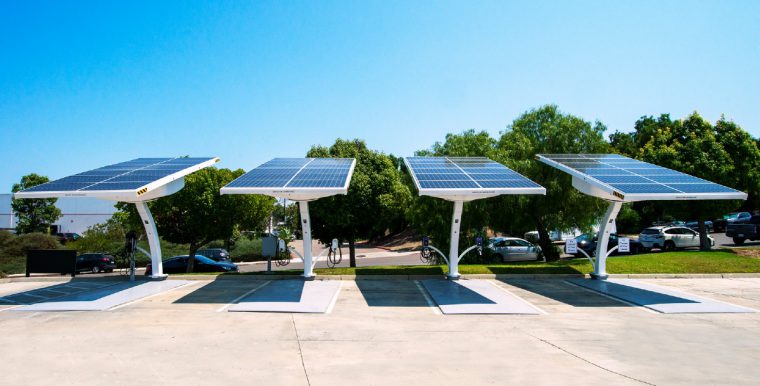
[cspt-portfolio h_h2=” EV Charger” h_h4=” EV Charger Solution ” h_description=” EV chargers are an important part of owning an electric vehicle. Either you need to own one, or you have to find a publicly available one. There are over 109,100 public chargers available in the US, but it is much more convenient to charge at home when possible.
Technically, what most people call “EV chargers“ are actually Electric Vehicle Supply Equipment (EVSE). They basically convert the power to a format that the electric vehicle can accept; the charger itself is built into the car. That being said, the most popular term for these units that’s seemed to stick is “EV chargers.“ Most cars will come with a basic Level 1 portable charger. These can be plugged into a standard wall outlet and used to charge your car. While they will provide power over time, they’re pretty slow, and a full charge can take a long time using one of these units.
An alternative to at-home charging is using publically available EV charging stations. These stations are popping up all over the place, from restaurants and convenience stores to malls and offices. These chargers are much more powerful than the charger an electric car comes with and can add significant range to your vehicle in a relatively short amount of time. If you have EV charging stations at your workplace or other places you frequent, you may be able to top up your car during your day and never need to charge overnight at home.
Electric vehicle (EV) sales are projected to grow dramatically, with millions more cars coming to the roads in the next few years. But where will these cars charge up? At this moment, the US has roughly 168,000 gas stations but only 44,417 publicly available EV charging stations. That means the infrastructure has a long way to go to catch up This trend presents a unique opportunity for electrical distributors and contractors. Both homeowners and businesses will be looking to have EV charging stations installed in the coming years to accommodate their new electric cars. Homeowners may seek the convenience of rapidly charging their car at home. Businesses will need a way to keep their electric fleet or their employees’ cars topped up. Places like hotels, restaurants and retail stores might need to add these to increase traffic and keep customers happy.
As contractors and distributors start to focus on opportunities in the EV charging market, rebates will likely be a key to their success. The cost of installing an EV charger can add up for a homeowner or a business and can make it harder to get customers to install these stations. Because of that, many organizations across the country are providing rebates, incentives, and tax credits for installing EV chargers. While many in the industry may be familiar with rebates for equipment like lighting or HVAC that have been around for years, EV charger rebates can work a little differently.” style=”2″ show=”12″ gap=”15px”]
Technically, what most people call “EV chargers“ are actually Electric Vehicle Supply Equipment (EVSE). They basically convert the power to a format that the electric vehicle can accept; the charger itself is built into the car. That being said, the most popular term for these units that’s seemed to stick is “EV chargers.“ Most cars will come with a basic Level 1 portable charger. These can be plugged into a standard wall outlet and used to charge your car. While they will provide power over time, they’re pretty slow, and a full charge can take a long time using one of these units.
An alternative to at-home charging is using publically available EV charging stations. These stations are popping up all over the place, from restaurants and convenience stores to malls and offices. These chargers are much more powerful than the charger an electric car comes with and can add significant range to your vehicle in a relatively short amount of time. If you have EV charging stations at your workplace or other places you frequent, you may be able to top up your car during your day and never need to charge overnight at home.
Electric vehicle (EV) sales are projected to grow dramatically, with millions more cars coming to the roads in the next few years. But where will these cars charge up? At this moment, the US has roughly 168,000 gas stations but only 44,417 publicly available EV charging stations. That means the infrastructure has a long way to go to catch up This trend presents a unique opportunity for electrical distributors and contractors. Both homeowners and businesses will be looking to have EV charging stations installed in the coming years to accommodate their new electric cars. Homeowners may seek the convenience of rapidly charging their car at home. Businesses will need a way to keep their electric fleet or their employees’ cars topped up. Places like hotels, restaurants and retail stores might need to add these to increase traffic and keep customers happy.
As contractors and distributors start to focus on opportunities in the EV charging market, rebates will likely be a key to their success. The cost of installing an EV charger can add up for a homeowner or a business and can make it harder to get customers to install these stations. Because of that, many organizations across the country are providing rebates, incentives, and tax credits for installing EV chargers. While many in the industry may be familiar with rebates for equipment like lighting or HVAC that have been around for years, EV charger rebates can work a little differently.” style=”2″ show=”12″ gap=”15px”]
